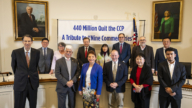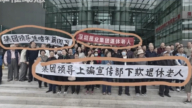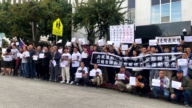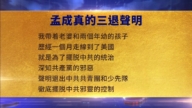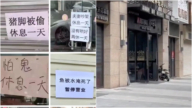【新唐人2011年7月22日讯】新疆“7.5”事件已过去两年了,然而两年后的7月18号,新疆再度发生流血冲突。近来,内蒙古、新疆、西藏先后爆发大规模冲突事件,北京一直以来实行的软硬两手策略,为什么不能安抚这些少数民族?中共的边疆政策再度成为关注的焦点。请看报导。
新疆和田市18号发生流血事件,7月20号,中共当局首次公布,在冲突中警方打死了14人。并指控是维吾尔人恐怖袭击派出所导致的。
而《美国之音》“维族组织称中国官方有关暴乱说法漏洞百出”的报导说:“世界维吾尔代表大会”发言人迪里夏提质疑中共,他表示,中共当局对维吾尔人在抗议之前遭到的武力镇压和冲突,刻意回避,而且指控20多人参与事件,并说有2人死亡,但是当“世维会”发布信息指出有20人死亡时,当局后来才更改为14人。
中共还指控喀甚地区的维吾尔人流窜到和田,不过,迪里夏提质问:如果喀甚地区有恐怖涉嫌,为何不在喀甚作案,而流窜到和田?中共没有提出有力的、令人信服的证据。
《北京之春》杂志主编胡平表示,中共政权和少数民族的关系搞得这么紧张,超过历史上任何时候。
胡平(杂志主编):“共产党它名义上是自治,但大家谁都知道它根本不是自治。而且它对这些少数民族的控制,甚至比它对这些汉人的少数控制还要更严厉。共产党它掌权60年了,在这些所有地方的,自治区的第一把手,单位第一书记,那都不是由少数民族担任,都是由汉族担任。”
胡平认为,现在少数民族的自我意识、公民的意识、自由权利的意识和自治的意识,都比原来更强。中共强制压迫与歧视少数民族的作法,就会造成层出不穷的矛盾与冲突。
今年5月25号,2000多名蒙古族学生和牧民,在内蒙古自治区政府所在地示威,要求惩罚碾死牧民莫日根的肇事者。
5月29日,配备盾牌,警棍和头盔的数百名武警和防暴警察,在呼和浩特市戒严,有的大学进出口被警察封锁,内蒙古多个城镇的互联网被中断或完全切断。
法学教授袁红冰:“最近一段时间以来啊,中国境内最大的三个少数民族地区,一个是西藏、一个是内蒙、一个是新疆,发生的一系列的少数民族反抗中共暴政的事件,据我们了解呢,媒体上公开公布出来的那些事件,只是实际发生事件的一小部分。更多的少数民族的反抗,被中共的新闻铁幕封闭在这个中国的境内。外边的人更不能广泛的知道这些事情。”
法学教授袁红冰表示,现在各少数民族反抗中共暴政的行为,已经掀起了新的高潮。为什么会变成这种情况?主要是因为中共在各少数民族地区施行的政治、经济和文化政策造成的。
袁红冰:“从政治和文化的角度讲,中共对各个少数民族一直施行的是文化型的种族灭绝。也就是说它们要用中共的党文化,来取代各个少数民族自己的文化。”
从经济上,中共对各个少数民族地区的自然资源,进行掠夺性的开发和利用。
袁红冰说,中共表面上投入资金,所谓支持少数民族地区的发展,实际上却从各个少数民族地区攫取、掠夺走大量自然资源。
袁红冰:“也就是以一种极其不负责任的一种‘殖民主义者’的方式,从少数民族大量的掠夺财富、掠夺自然资源。造成生态环境极其严重的破坏。这种破坏实际在相当程度上已经影响到了各少数民族地区人民的生存。”
袁红冰最后表示,今天少数民族一系列的反抗,说明中共的边疆政策已经遭到了彻底的失败。少数民族对中共的反抗会越来越激烈。
新唐人记者周玉林、唐睿、周平采访报导。
Conflicts with Minorities Escalate
Two years after the Xinjiang incident on July 5, 2009,
bloodshed took place again on July 18, 2011.
Recently, large-scale conflicts have broken out
in Inner Mongolia, Xinjiang and Tibet.
Both soft and hard policies used Beijing
cannot pacify the angers of China’s ethnic minorities.
The Chinese Communist Party’s (CCP)
ethnic policies once again draw the world’s attention.
Let’s take a closer look.
Bloodshed occurred in Hotan, Xinjiang on July 18.
On July 20, the CCP authorities first announced that
14 people were killed by the police in the conflict.
The CCP accused the Uyghur people for
a terrorist attack on a local police station
and for causing the bloodshed.
According to Voice of America,
the World Uyghur Congress’s spokesman Dilxat Raxit
questioned why the CCP authorities avoided mentioning
that the Uyghurs had already been violently suppressed
even before they protested.
He also questioned why the authorities first accused
20 Uyghur people of participating in the incident
and said there were two deaths,
but later changed to 14 deaths
after the World Uyghur Congress announced 20 deaths.
The authorities also accused the Uyghurs in Kashgar
of going to Hotan to carry out terrorist acts.
However, Dilxat Raxit questioned,
if they were terrorists,
why did not they launch terrorist attacks
in the nearby Kashgar?
The CCP did not present any powerful, convincing evidence.
Hu Ping, editor-in-chief of Beijing Spring said,
the relationship between the CCP regime and
the minorities is the most tense in history.
Hu Ping: “Xinjiang is nominally autonomous.
However, everyone knows that it is not, in reality.
The CCP’s control over minorities is
even tighter than over some of the Han people.
Throughout the CCP’s rule of 60 years,
the first commander in the autonomous regions
has always been a Han national.
The CCP has never appointed any minorities.”
Hu believes that the ethnic minorities’ self-conscience
and the awareness for citizenship and freedom
are stronger than ever before.
The CCP’s suppressive and discriminating acts
are bound to create unceasing conflicts and discords.
On May 25, 2011, over 2000 Mongolian students
and herdsmen gathered in the capital of Inner Mongolia,
requesting the punishment of the criminals
who crushed a herdsman called Mergen to death.
On May 29, hundreds of riot policemen
armed with shields, armors and batons
carried out marshal law in Hohhot City.
The entrances of some universities
were blocked by police.
Internet connections were cut off
in many cities and towns in Inner Mongolia.
Yuan Hongbing, professor of law:
“Recently, in the three major regions
inhabited by ethnic minorities,
i.e., Tibet, Inner Mongolia and Xinjiang,
a series of incidents opposing CCP’s tyranny occurred.
As we know, only a small number of
these incidents were reported on the Chinese media.
Instead, many such anti-suppression incidents
were stifled by the CCP’s censorship.
People outside of China
have trouble accessing such information.
Yuan said, a new wave of anti-CCP tyranny
by ethnic minorities is developing.
What’s the reason?
It was because the CCP has implemented unpopular
political, economical and cultural policies in these regions.
Yuan: “From the political and cultural perspectives,
the CCP has been carrying out a cultural genocide.
In other words, the CCP wants to use its party culture
to replace the minorities’ own cultures.”
The CCP robbed and developed natural resources
in a predatory way, in all ethnic minority regions.
Yuan said, superficially, the CCP has invested a lot
to support the so-called development in these regions.
However, in fact, the CCP has taken away
a large amount of natural resources.
Yuan: “In an extremely irresponsible ‘colonist’ manner,
the CCP has plundered the wealth and natural resources.
This has caused a serious damage to the environment.
The ecological damage has already affected
the survival of the minorities.
Yuan said in the end that
the series of minority resistance indicates that
the CCP’s minority polices failed completely.
It is expected that the minority resistance
to the CCP will be increasingly intense.
NTD reporters Zhou Yulin, Tang Rui and Zhou Ping


